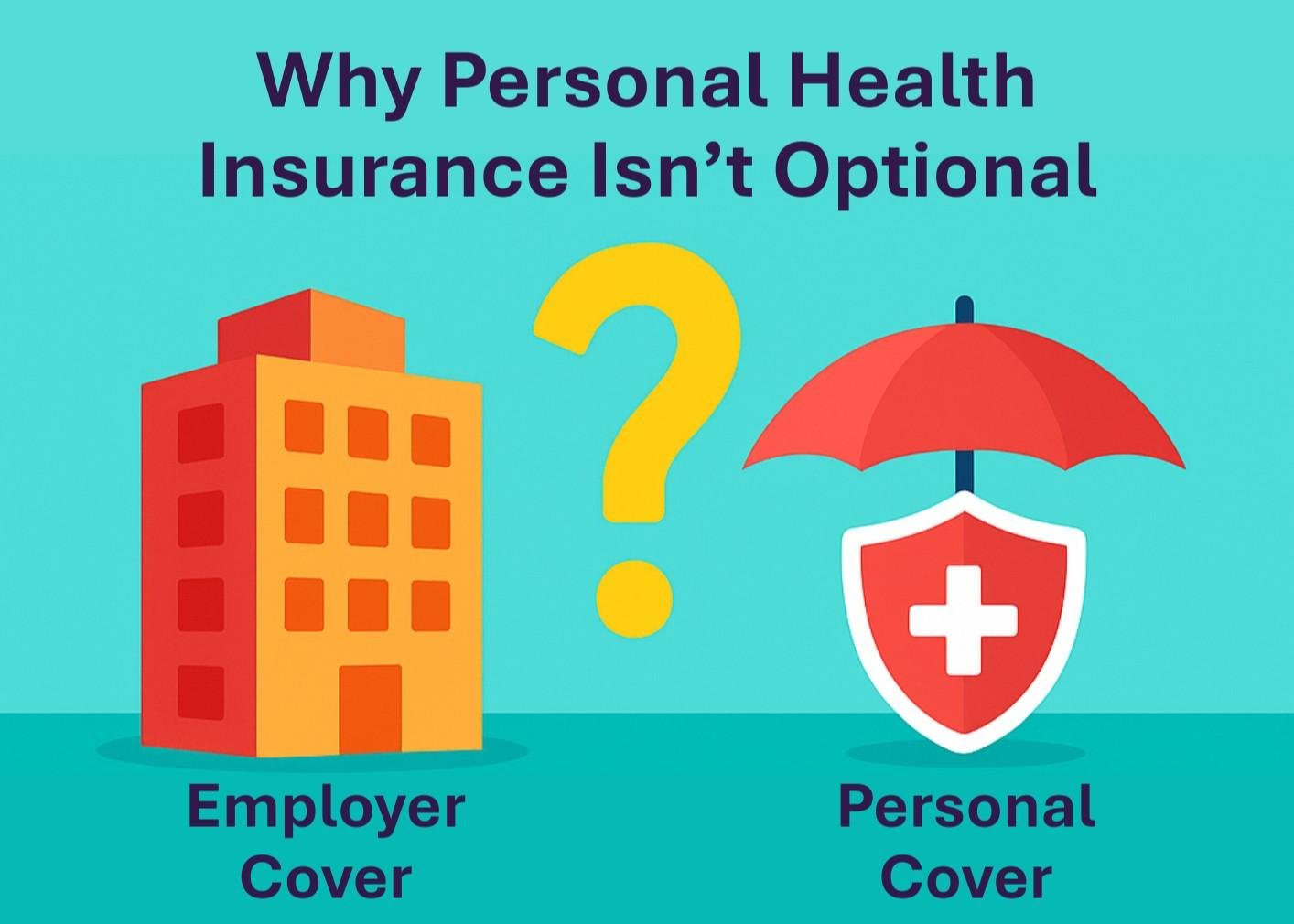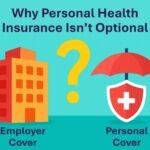Blogs
Insurance 101: Don’t Rely Only on Employer Health Insurance — Protect Yourself Now with Personal Cover
Imagine it’s monsoon season in Mumbai. Would you leave your umbrella behind just because your office keeps a few spare at the reception? Sounds risky, right?
If you’re like most salaried professionals, your job probably comes with a comforting line: “Includes Health Insurance for You & Your Family.” It feels like one less thing to worry about — a silent checkbox ticked. After all, if your employer is already covering you, why bother buying your own policy?
But here’s a question worth asking: Is that really all the cover you need?
In this blog, we’ll explore why relying only on your employer’s group health insurance could be a risky bet, and how adding a personal plan can give you control, peace of mind, and actual protection.
Why Employer Health Insurance Feels ‘Safe’ — But Isn’t?
Your company-sponsored health insurance has its advantages:
- It’s free or subsidized.
- It starts from day one.
- No medical tests or long forms.
But here’s the catch: your job pays for it — and also controls it. It’s like having your landlord cover your Wi-Fi. Great… until they cancel it mid-meeting.
Employer group insurance often comes with limitations that don’t show up until the moment you actually need it. And that’s when it stings.
7 Hidden Risks of Relying Solely on Employer Health Insurance
- Job Switch = Policy Switch: Your cover ends when you resign or laid off. What if you’re between jobs or on a break?
- No Control Over Coverage: You can’t choose the sum insured or the insurer. Employer decides.
- Coverage May Be Too Low: 3-5 lakhs per year, may have limited hospital coverage.
- Family Not Always Included: Some plans don’t cover parents or require co-pay for them.
- No Continuity Benefits: You lose claim-free years, portability, and cumulative bonus when switching jobs.
- Policy Terms Can Change Overnight: Employers can reduce benefits or remove dependents to cut costs.
- Retirement = No Cover: Once you retire, you’re on your own. Buying a new cover at 60+ is tough and expensive.
Why Add a Personal Health Insurance Plan?
Having your own policy is having your own umbrella — because you can’t count on the weather or someone else’s to keep you dry..
Here’s what a personal (individual or family floater) plan adds:
- Portability — It stays with you, no matter where you work.
- Customized Sum Insured — Choose ₹10L, ₹20L, or even more, depending on your family’s needs.
- Cumulative Bonuses — Each claim-free year adds extra cover.
- Wider Coverage — You choose the insurer, hospital network, and policy terms.
- Better Preparedness — Add riders for critical illness or OPD if needed.
- Peace of Mind During Career Breaks — Whether it’s a sabbatical, freelancing, or startup life.
- Long-term Protection — Buy now while you’re young and healthy. Premiums are lower and continuity is smoother.
Think of it as your own safety net — not borrowed, not temporary. Yours, always..
What Smart Professionals Do?
- Keep Your Employer Cover as First Line — Use it for smaller hospital claims.
- Buy a Family Floater Policy — Cover spouse, kids, and even parents under one roof.
- Add a Super Top-Up Plan — This gives you high cover (₹20L-₹50L) at low premiums above a certain deductible.
- Buy Early — Premiums go up with age. Don’t wait till a diagnosis forces your hand.
- Review Cover Every Few Years — Rising income and lifestyle may increase your need for enhanced health protection.
Peace of Mind That’s Actually Yours .
Don’t let job switches or employer decisions decide how well your family sleeps at night. Your employer’s health insurance is a helpful perk — but your personal plan is your real shield. It’s the difference between temporary comfort and long-term security.
And like any smart financial move, the best time to start is before you actually need it — when you’re young, healthy, and still in control.
📌 Frequently Asked Questions .
Is employer health insurance enough in India?
Not always. While it’s a useful benefit, most employer health plans have limited sum insured, fewer customization options, and no continuity once you leave the job. They’re a great first line of defence — but not a complete solution.
What happens to my health cover if I leave my job?
Your employer-sponsored health insurance typically ends the day you resign or are laid off. If you don’t have a personal policy in place, you’ll be left unprotected during job transitions, sabbaticals, or retirement.
Why do I need personal health insurance if I already have employer cover?
A personal plan gives you long-term protection, continuity of benefits, and full control over coverage. It’s portable, customizable, and ensures your family stays protected even when your employment status changes.
Employer cover vs Personal Cover: Here’s how the two compare —
Features |
Employer Group Cover |
Personal Health Insurance |
| Sum Insured | Often limited (₹3–5L) | Flexibility, you choose ₹10L/ ₹20L/ ₹50L etc. |
| Coverage Customization | Limited standard benefits decided by Employer | Tailored plans, riders, OPD, critical illness options |
| Pre‑existing Conditions Waiting period | Covered from Day 1, but no continuity benefits | Initially waiting periods applies, but continuity benefits later |
| Policy Control | Employer decides | You choose insurer, plan, terms |
| Family Inclusion | May exclude parents | You choose whom to cover |
| Hospital Network Coverage | May be limited to specific hospitals | Generally wider network coverage |
| Portability | Ends when you leave the job | Continues and portable regardless of employment |
| Continuity at Retirement/ long‑term Renewability | Ends when job ends | Lifelong renewability |
| Claim Bonus | Not applicable | Earns bonuses |
| Tax Treatment | Deduction only if you contribute | Policyholder can claim full 80D deduction |
Still Confused?
Let’s make this simpler. If you want a quick personalized recommendation or want to know how much cover is ideal for your life stage, We will be happy to guide you. No jargon. Just clarity.
Note: This blog is for educational purposes only and should not be treated as personal or financial advice. Insurance is a subject matter of solicitation.
#trupointValueServices #HealthInsurance #PersonalHealthCover #SmartMoneyDecisions #FinancialWellbeing






